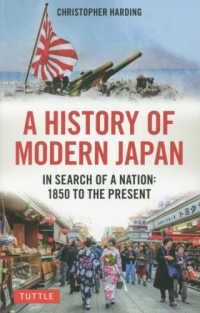- ホーム
- > 洋書
- > 英文書
- > Philosophy
Full Description
Much of what we say is never said aloud. It occurs only silently, as inner speech. We chastise, congratulate, joke, and generate endless commentary, all without making a sound. This distinctively human ability to create public language in the privacy of our own minds-to, in a sense, "hear" ourselves talking when no one else can-is no less remarkable for its familiarity. And yet, until recently, inner speech remained at the periphery of philosophical and psychological theorizing. This volume, comprised of chapters written by an interdisciplinary group of leading philosophers, psychologists, and neuroscientists, displays the rapidly growing interest among researchers in the puzzles surrounding the nature and cognitive role of the inner voice. Questions explored include: the aids and obstacles inner speech presents to self-knowledge; the complex relation it bears to overt speech production and perception; the means by which inner speech can be identified and empirically assessed; its role in generating auditory verbal hallucinations; and its relationship to conceptual thought itself.
Contents
0: Peter Langland-Hassan and Agustin Vicente: Introduction
Part I: The Nature of Inner Speech
1: Peter Carruthers: The causes and contents of inner speech
2: Christopher Gauker: Inner speech as the internalization of outer speech
3: Peter Langland-Hassan: From introspection to essence: the auditory nature of inner speech
4: Sharon Geva: Inner speech and mental imagery: a neuroscientific perspective
5: Hélène Loevenbruck, R. Grandchamp, L. Rapin, L. Nalborczyk, M. Dohen, P. Perrier, M. Baciu, and Marcela Perrone-Bortolotti: A neurocognitive model of inner language: to predict, to hear, to see and to feel
6: Russell Hurlburt and Christopher Heavey: Inner speaking as pristine inner experience
Part II: Inner Speech, Self-Reflection, and Self-Knowledge
7: José Luis Bermúdez: Inner speech, determinacy, and thinking consciously about thoughts
8: Keith Frankish: Inner speech and outer thought
9: Sam Wilkinson and Charles Fernyhough: When inner speech misleads
10: Edouard Machery: Know thyself: beliefs vs. desires in inner speech
11: Alain Morin: The self-reflective function of inner speech: thirteen years later
12: Lauren Swiney: Activity, agency, and inner speech pathology








